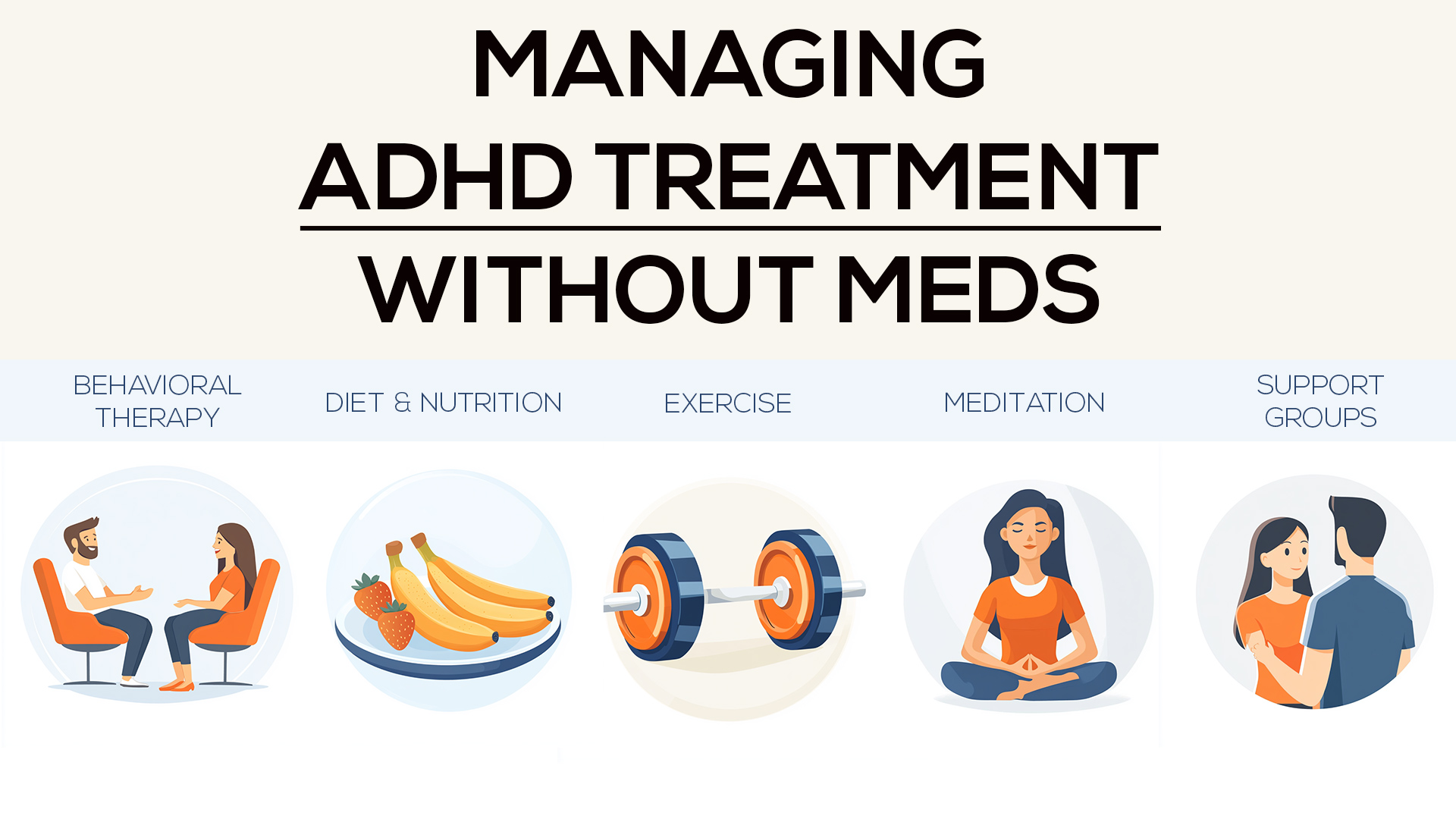ADHD treatment without meds focuses on behavioral interventions, lifestyle changes, and supportive therapies that empower individuals to manage symptoms naturally. From mindfulness exercises to dietary adjustments, these strategies cater to those seeking alternatives to medication. These methods offer a holistic approach for individuals who seek non-medication solutions to ADHD challenges. As a licensed psychologist, here are the recommendations I offer my clients:
Non-Medication ADHD Treatment Options
Behavioral Therapy
One of the most effective non-drug approaches, behavioral therapy focuses on identifying and modifying behaviors that interfere with daily life. Cognitive Behavioral Therapy (CBT), in particular, helps individuals build strategies for organization and self-regulation. Dr. William Dodson, ADHD specialist, notes, “Behavioral therapy empowers individuals to take control of their actions through practical, repeatable strategies.”
In practice, CBT sessions often include breaking tasks into smaller, manageable steps and creating systems to reinforce positive behaviors. For children, this might involve reward charts and structured routines, while adults often benefit from time management tools and strategies to combat procrastination. Family therapy may also complement CBT, ensuring that parents and caregivers are aligned in implementing consistent behavioral techniques at home. This collaborative approach builds a supportive environment that reinforces progress and reduces conflicts.
Diet and Nutrition
Research suggests that dietary choices can influence ADHD symptoms. The Feingold Diet, which eliminates artificial additives, and an omega-3-rich diet are frequently recommended. Harvard Health highlights, “The link between nutrition and brain health makes dietary adjustments an important step in ADHD management.”
Additionally, avoiding high-sugar and processed foods has been shown to stabilize energy levels and improve focus. Incorporating whole foods like lean proteins, fruits, and vegetables into meals can provide essential nutrients for optimal brain function.
Zinc, magnesium, and iron are particularly critical for neurotransmitter activity and are often lacking in those with ADHD. Consulting a nutritionist familiar with ADHD can help tailor a diet plan that meets individual needs while addressing sensitivities or allergies that may exacerbate symptoms.
Exercise
Exercise acts as a natural stimulant, enhancing dopamine and norepinephrine production. Physical activities like yoga and martial arts improve focus, reduce impulsivity, and promote mental clarity.
For children, incorporating play-based exercises such as obstacle courses or team sports can make physical activity enjoyable and sustainable. Adults may find activities like running, cycling, or strength training effective for channeling restless energy and improving concentration.
Structured programs like CrossFit or dance classes provide social interaction alongside physical benefits, further enhancing mood and focus. Studies suggest that even short bursts of exercise, such as 20 minutes of high-intensity interval training (HIIT), can yield immediate improvements in attention and executive function.
Mindfulness and Meditation
Mindfulness training has gained traction as a viable ADHD treatment without meds. Practices like guided meditation can improve attention span and emotional regulation. According to the APA, “Mindfulness techniques offer individuals a way to calm the mental restlessness associated with ADHD.”
Simple techniques such as mindful breathing or body scans can help individuals anchor themselves during moments of distraction or overwhelm. Apps like Headspace or Calm provide structured mindfulness programs tailored to ADHD users, making it easier to adopt these practices consistently. Over time, mindfulness can reduce stress levels, improve emotional control, and enhance task completion. Integrating mindfulness into daily routines, such as practicing gratitude before bed or doing a brief meditation during work breaks, reinforces these benefits.
Coaching and Support Groups
ADHD coaching focuses on skill-building and accountability. Support groups, on the other hand, provide emotional connection and shared experiences, fostering a sense of community.
Coaches work with clients to create personalized strategies for overcoming specific challenges, such as meeting deadlines or improving communication. They often use tools like visual planners, habit trackers, and digital reminders to foster consistency.
Support groups complement this by offering a safe space to share experiences, gain encouragement, and learn from others. For parents, support groups provide valuable insights into managing children’s symptoms, while adult groups can address workplace struggles and relationship dynamics. Together, coaching and peer support empower individuals to feel understood and equipped to manage ADHD more effectively.
Comparison to Medication
Medication often provides immediate symptom relief but comes with potential side effects, including insomnia, appetite suppression, and mood swings. Non-medication treatments, while slower to show results, address the root causes of ADHD symptoms and improve long-term outcomes. Combining therapies often yields the best results.
When comparing approaches, medication is often a first-line treatment for individuals seeking quick control over symptoms like hyperactivity and inattention. However, these benefits may diminish over time, requiring dosage adjustments or a combination of medications. Non-medication treatments, such as behavioral therapy and mindfulness practices, provide tools for managing ADHD beyond the pharmaceutical realm, promoting resilience and self-regulation.
In children, a dual approach often works best, incorporating medication for immediate symptom management alongside therapy to teach life-long coping skills. For adults, therapy and coaching can reduce dependence on medication and address coexisting challenges like anxiety or workplace stress. This comprehensive approach empowers individuals to gain mastery over their symptoms while minimizing reliance on medication.
Affordable ADHD Testing to Support Your Treatment Journey
Understanding the right approach to managing ADHD begins with a precise diagnosis. At Express ADHD Diagnostics, we provide affordable testing services tailored to individuals and families seeking clarity and actionable results. Whether you’re exploring behavioral therapy, dietary adjustments, or other non-medication treatments, our diagnostic services set the foundation for effective management.
Our child ADHD diagnostic testing, priced at just $150, and adult ADHD diagnostic services at $250, offer cost-effective solutions without the constraints of insurance. For those needing ongoing guidance, our $100/hour follow-up consultations provide expert support to help you navigate treatment options. By identifying specific challenges and strengths, our services empower you to select the best non-medication interventions or explore medication if necessary. Ready to take control of your ADHD journey? Schedule your evaluation today.
Benefits of Choosing Express ADHD Diagnostics
With Express ADHD Diagnostics, accessibility is a cornerstone of our services. By offering flat-rate pricing—$150 for child testing and $250 for adult testing—you avoid the financial unpredictability of insurance billing. This approach ensures that testing is available to those who might otherwise face barriers due to high out-of-pocket costs or limited insurance coverage.
Our expedited process delivers results within two days, a significant advantage compared to weeks-long waits at other clinics. This allows individuals to take immediate action, whether that means starting therapy, exploring medication options, or implementing lifestyle changes. For patients who prefer insurance-covered services, our seamless referral process to Renu Mental Wellness Group provides continuity of care without added stress.
By prioritizing affordability, efficiency, and choice, Express ADHD Diagnostics makes ADHD testing and management accessible to everyone. Ready to take the next step? Schedule your evaluation today.
Empower Your ADHD Journey
Exploring ADHD treatment without meds begins with understanding your unique needs. A professional ADHD evaluation can guide your next steps, whether you opt for therapy, lifestyle changes, or medication. Don’t wait—schedule your ADHD test today!
References
- Can ADHD Be Effectively Treated Without Medication?
- Non-drug treatments for adult ADHD – Harvard Health
- How to Manage ADHD Without Medication for Adults
- The Feingold Diet and Other Alternative Treatments for ADHD
- Easing ADHD Without Meds
- 9 Natural Remedies for ADHD Without Medication — Talkspace
Photos by NAMYNOT Inc.



